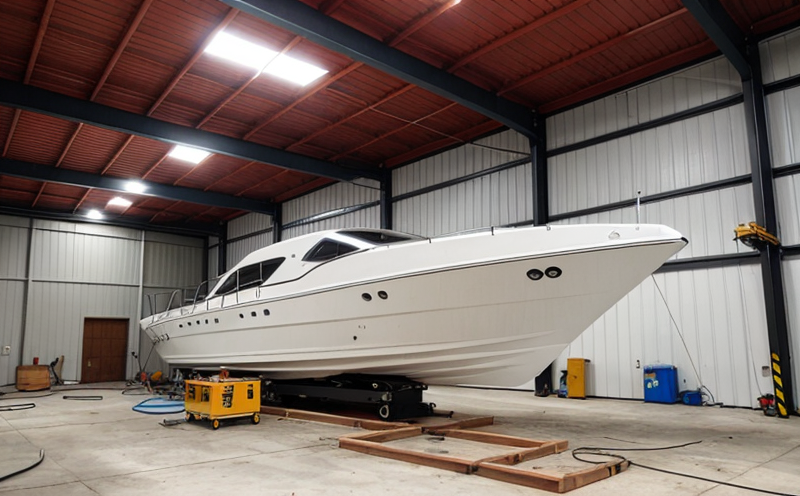ISO 11359 Thermal Expansion Coefficient Testing for Marine Composites
The ISO 11359 standard is a globally recognized protocol designed specifically to determine the thermal expansion coefficient of marine composite materials. This service is crucial in ensuring that the structural integrity and performance of marine equipment, such as hulls, decks, and bulkheads, are maintained under varying environmental conditions. The test measures how these materials expand or contract when subjected to temperature changes.
Marine composite structures are critical components of modern ships and offshore platforms. They must withstand harsh environments including saltwater exposure, mechanical stress from waves, and thermal cycling due to changing weather conditions. Accurate determination of the thermal expansion coefficient is essential for predicting long-term performance and durability, ensuring that these materials do not fail under operational stresses.
The testing procedure involves subjecting a specimen cut from the composite material to controlled temperature changes in an environmental chamber. The change in length over time is measured using precision instrumentation. This data is then used to calculate the thermal expansion coefficient according to ISO 11359 guidelines. Understanding this property allows for the design of more resilient and reliable marine structures, thereby enhancing safety and operational efficiency.
Our laboratory adheres strictly to ISO 11359 standards, ensuring accurate results that are internationally recognized and accepted in the maritime industry. We employ state-of-the-art equipment and trained personnel to conduct these tests with precision and reliability. Our clients can expect detailed reports outlining test parameters, specimen preparation methods, environmental conditions, and final calculated thermal expansion coefficients.
By incorporating ISO 11359 testing into their quality control processes, companies in the marine sector can ensure that their products meet stringent regulatory requirements while also contributing to advancements in sustainable design practices. This service is particularly valuable for manufacturers of composite materials used in shipbuilding and offshore structures, where reliability under diverse conditions is paramount.
We understand that compliance with standards like ISO 11359 is not just a requirement but an opportunity to innovate and improve product performance. Our laboratory offers this testing as part of a broader suite of services aimed at supporting the development and quality assurance of marine equipment. Whether you are involved in research, manufacturing, or regulatory affairs, our expertise can help you stay ahead in this competitive industry.
To learn more about how ISO 11359 thermal expansion coefficient testing can benefit your organization, please contact us today to arrange a consultation with one of our specialists.
Scope and Methodology
The scope of the ISO 11359 Thermal Expansion Coefficient Testing for Marine Composites includes determining the coefficient of thermal expansion (CTE) of marine composite materials. This parameter is critical in assessing the performance of structural components under varying temperatures, which is especially important for maritime applications where environmental factors play a significant role.
The methodology involves several key steps:
- Sample Preparation: Specimens are cut from the composite material according to ISO 11359 specifications. These specimens must be representative of the intended application and free from defects that could affect test results.
- Environmental Control: The samples are placed in a controlled environment chamber where temperature changes are precisely regulated. The chamber is capable of simulating real-world conditions encountered by marine structures.
- Data Collection: Using high-precision instrumentation, the change in length of each specimen is measured over time as it undergoes thermal cycling. This data is then used to calculate the thermal expansion coefficient using established formulas from ISO 11359.
The results are compared against industry standards and guidelines to ensure compliance with relevant regulations. Our laboratory ensures that all tests meet the strict requirements set forth by ISO, providing accurate and reliable data for our clients.
Industry Applications
The results of ISO 11359 thermal expansion coefficient testing have a wide range of applications within the marine sector:
- Shipbuilding: Ensuring that composite materials used in ship hulls and decks perform consistently under varying temperatures, enhancing safety and operational efficiency.
- Offshore Structures: Predicting long-term performance of composite components in harsh offshore environments to prevent failures due to thermal expansion.
- Marine R&D: Supporting research into new materials and designs that can withstand the unique challenges faced by marine structures, leading to more innovative and sustainable solutions.
By accurately measuring the thermal expansion coefficient of composite materials, this testing helps manufacturers and researchers improve product design and performance, ultimately contributing to a safer and more efficient maritime industry.
Environmental and Sustainability Contributions
The precision with which ISO 11359 thermal expansion coefficient testing is conducted has significant environmental and sustainability implications. By ensuring that composite materials used in marine structures perform reliably under temperature variations, this service contributes to the overall efficiency of maritime operations.
Maintaining structural integrity through accurate CTE determination helps reduce the frequency of maintenance and replacement, thus minimizing waste and resource consumption. Additionally, by using sustainable materials where possible and optimizing their performance, manufacturers can contribute to a more environmentally friendly industry.
Our laboratory’s commitment to adhering strictly to ISO 11359 standards not only guarantees accurate results but also supports the development of products that meet regulatory requirements while promoting sustainability. This aligns with broader efforts in the maritime sector towards reducing environmental impact and improving operational efficiency.





